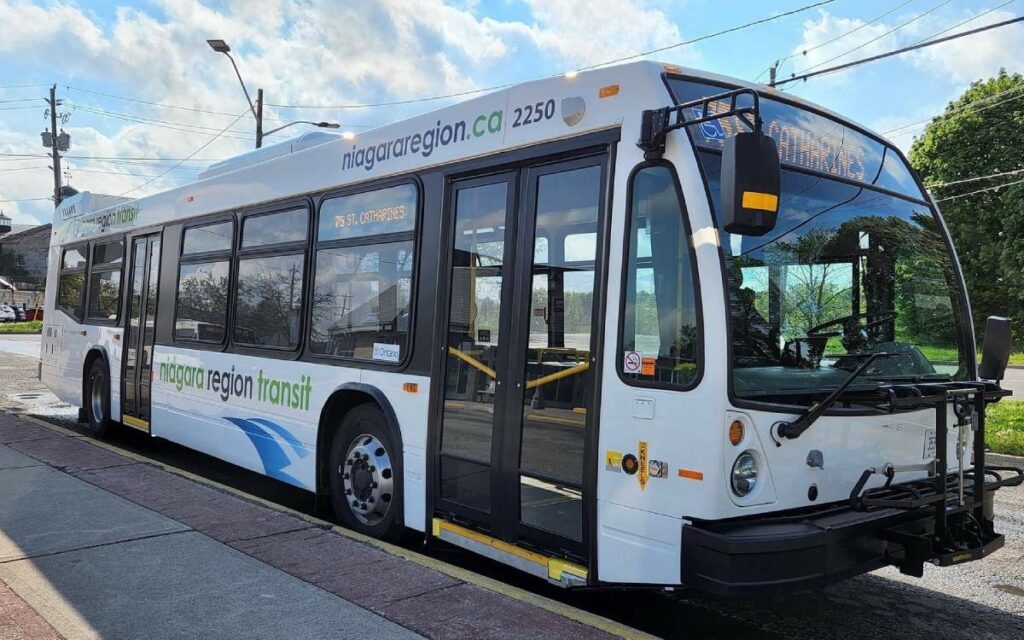
Niagara Region residents won’t be facing a fare increase when using transit in 2024, despite attempts by the Niagara Transit Commission to increase fares. Photo Credit: CPTDB Wiki.
Niagara Region residents won’t be facing a fare increase when using transit in 2024, despite attempts by the Niagara Transit Commission to increase fares.
The Region’s transit commission recommended to council that local fares be increased from $3 per ride to $3.25 per ride for 2024.
Commissioners had approved a 25-cent increase in fares internally in an eight to five vote but faced significant opposition from council.
Regional councillors, including Councillor Laura Ip of St. Catharines, worried about the impact the fare hike would have on those with lower incomes. She advocated instead for the Region to dedicate more tax dollars to make up transit’s budget gap.
“What we should be doing is increasing our investment in transit,” Ip said.
St. Catharines Mayor Mat Siscoe, also the chair of the Niagara Transit Commission, opposed a fare increase or a reduction in service provision.
Fares are currently $3 for transit rides within localities but jump to $6 when riders want to access transit to go from one part of the Niagara region to another.
A study is presently being conducted to look at changes to transit fares for 2025.
One of the reasons commissioners had approved a fare increase was to try to grapple with long-term capital concerns. Twenty-one aging buses are scheduled to be replaced in 2024.
Ip’s decision to have council weigh in on the commission’s budget plan, including the fare increase, wasn’t favoured by all councillors. Several, including Niagara Councillor Bob Gale, felt the Region shouldn’t be micromanaging the commission’s budgetary decisions.
However, others felt increasing fares violated the Municipal Transfer Agreement that led to the consolidation of the region’s transit authorities last year.
Regional transit is relatively new in Niagara. Beginning on Jan. 1, 2023, the transit systems of 12 local municipalities were rolled into the larger Niagara Region Transit via the Municipal Transfer Agreement among participating local municipalities.
The new Niagara Region Transit incorporated local transit systems in the existing Niagara Region Transit and added Niagara Falls Transit, St. Catharines Transit, Welland Transit and Fort Erie Transit. Regional transit now operates as one unit.
At the time, bus routes were not changed, but fares among local municipalities were harmonized. Those fee changes are one of the reasons a study is currently underway to look at changes to regional fares and other structural changes come 2025.
After deliberating on the fare increase, council ultimately sided with Ip and rescinded the fare increase.
It also voted to increase the transit budget for 2024 by 5.57 per cent instead of the requested 7.8 per cent.
Transit fares in the Niagara region are lower than in many other regions of southern Ontario. Oakville riders pay $4 per ride. Riders in Hamilton and Burlington pay $3.50. And transit users in Toronto pay $3.35.
The Niagara Region Transit’s relatively low fares compared to elsewhere in the broader region may point to attempts to increase fares after the study examining potential changes to regional transit for 2025 is completed.
A special levy of $58 million will be paid by Niagara Region residents through property taxes to subsidize Niagara Region Transit’s operations for 2024. That’s up from $55 million in 2023.

Jay Goldberg is the Ontario Director at the Canadian Taxpayers Federation. He previously served as a policy fellow at the Munk School of Public Policy and Global Affairs. Jay holds a Ph.D. in Political Science from the University of Toronto.




















